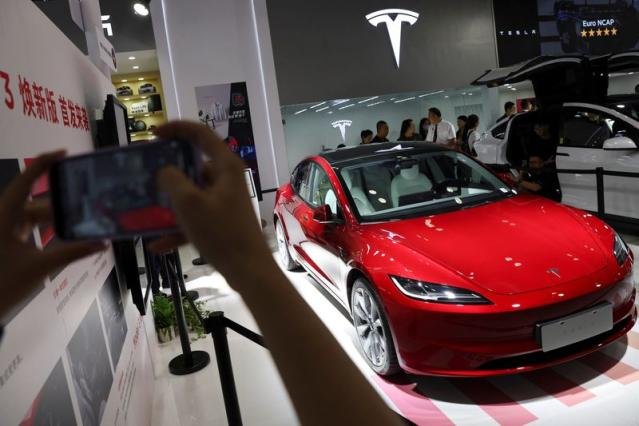Tesla sales experienced an unexpected spike during the final three months of 2023 due to discounted prices and customers taking advantage of tax breaks on electric vehicles before their availability becomes more difficult in 2024.
Tesla announced on Tuesday that they sold 484,500 cars during the fourth quarter, up from 435,000 sold during the previous third quarter and 405,000 during 2022’s fourth quarter. For 2024 as a whole, they expect to surpass established carmakers such as Mercedes-Benz and Renault by reaching two million car sales.

Tesla’s fourth quarter sales recovery should allay any investor concerns over whether or not it can maintain its dominant position in the electric vehicle market in light of increased competition from traditional automakers.
Over the past year, Tesla has experienced market share decline against competitors like General Motors, Hyundai, Ford Motor and Volkswagen as they introduced more electric vehicles. Tesla currently accounts for half of all EV sales within the United States market while two years prior it held two thirds share.
Rivian announced on Tuesday that it sold nearly 14,000 vehicles during the fourth quarter, up significantly year-on-year but down approximately 10 percent year-over-year.
Tesla faces fierce competition in China’s largest EV market from BYD and other Chinese automakers. BYD outsold Tesla by selling 526,000 fully electric cars worldwide during Q4, an event many auto analysts had been anticipating given BYD’s rapid expansion.
Chinese automakers have quickly developed more affordable electric models as the market has expanded beyond early adopters of technology, who were previously Tesla’s core customers and still bought Tesla models regularly.
“Customers purchasing electric vehicles now are second adopters, who have fundamentally different needs than first adopters,” noted Shay Natarajan of Mobility Impact Partners – a private equity fund dedicated to sustainable transport investments. They care about tangible cost reductions immediately realizable and convenience as top priorities for purchase decisions.
Schmidt Automotive Research’s data indicates that Volkswagen, Audi and Skoda sell more EVs in Europe than Tesla – yet Tesla Model Y remains by far the best-selling model across all regions on this continent.
People looking to purchase an electric car in the US had strong incentive to do so before year’s end due to new rules meant to cut China out of the supply chain.
Tesla had warned on its website that two least expensive versions of its Model 3 sedan no longer qualify for federal tax credits of $7,500 after December 31. These vehicles’ batteries come from China. Germany and other European nations have reduced subsidies to buyers of electric vehicles.
Tesla cut prices in order to sustain sales, offering Model 3s online at well under $30k after factoring in tax credits. By late December, lower-priced cars appeared less frequently on their website – evidence that their strategy had taken effect; but price cuts led profits at Tesla to plummet 44 percent from where they had been last year.
Tesla announced on Jan. 24 it will announce earnings for its fourth quarter 2023 onwards.
Tesla will qualify for federal tax credits less frequently in 2024 than most of its competitors, yet remains competitively advantaged over them. Both versions of its Model 3 Performance version, with upgraded wheels and brakes, and all versions of its Model Y SUV remain eligible according to federal government website data. Furthermore, batteries for those cars are produced at its Nevada factory operated with Panasonic for domestic manufacturing requirements to be met.
Tesla holds an advantage over competitors such as Ford, which recently stated that their Mustang Mach-E sport utility vehicle will no longer qualify for tax credits in 2018.
Ford and other major automobile companies rely heavily on Chinese suppliers for essential components. Ford plans on building battery factories in the United States by 2025; production may start sooner.
General Motors’ Ohio plant for battery production has struggled to reach full capacity. At first only the Chevrolet Bolt will qualify for tax credits according to G.M.’s announcement last December – no longer will Cadillac Lyriq or electric Chevrolet Blazer qualify.
G.M. announced its plans to adjust their supply chain so that these vehicles, and other ones like electric versions of Chevrolet Silverado pickup and Equinox sport utility vehicle models, become eligible early this year.
Tesla and other carmakers could gain from lower interest rates in 2019. Investors expect the Federal Reserve and other central banks to reduce interest rates as inflation slows, providing further boost for car manufacturers like Tesla.
Stay tuned to Centralfallout for the latest scoops and updates of Latest News, Trending News, Technology News, World News and Entertainment News.


